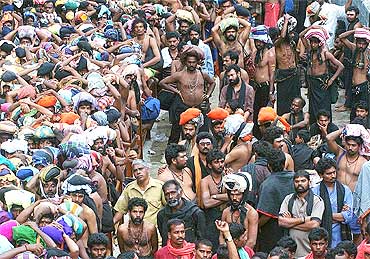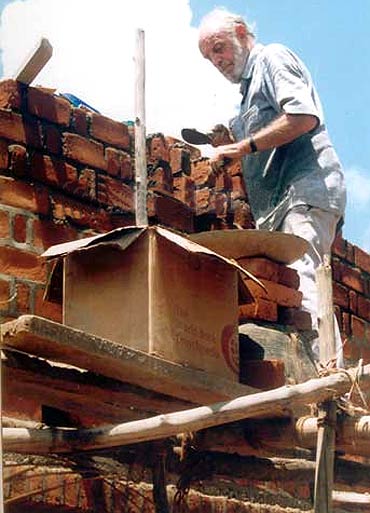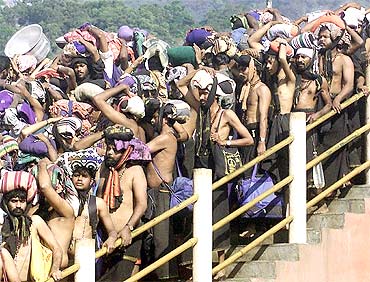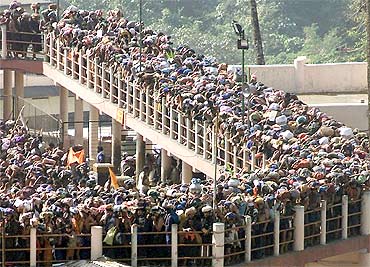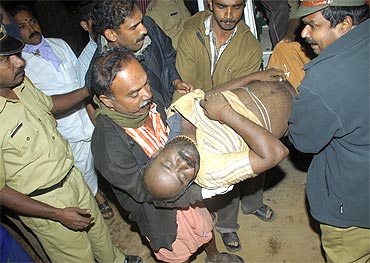 | « Back to article | Print this article |
Kerala govt IGNORED report on dangers of Sabarimala
Even as a debate is raging on the management of Sabarimala pilgrimage in the wake of the deadly stampede, a pictorial report prepared by eminent architect late Laurie Baker on creating essential amenities for devotees without harming nature has been gathering dust for the past 15 years.
The British-born humanist and advocate of low-cost buildings, who spent much of his later life in Kerala and acquired Indian citizenship, took a trip to Sabarimala in 1995 after a request from the state government. The Kerala government had asked him to provide inputs for plans to improve facilities for pilgrims without causing stress to the delicate environment.
Baker was 79 when he undertook the arduous trek from Pampa to Sabarimala, enjoying the natural settings of the area but feeling deeply concerned over the ecologically hostile constructions that had come up over the years.
The 36-page hand-written report, full of Baker's own drawings and illustrations, has proved prophetic now as it had warned that unless the roads leading to the base camp Pampa were developed into four-lanes, the pilgrimage could turn nightmarish any time.
Text: N Muraleedharan in Thiruvananthapuram/PTI
'The temple was a very great disappointment'
Much of the emphasis of Baker, however, has been on meeting the basic needs of millions of pilgrims coming to Sabarimala like drinking water, sanitation and cool and shady trees along the lines to provide relief to devotees who undertake the steep trek to the temple atop.
"As a nature lover, I have always been fascinated by forests and mountains. My pilgrimage to Sabarimala gave me the maximum enjoyment and pleasure as I first drove to Pampa and then walked to Sabarimala," he wrote.
But Baker added, "I am sad to say the world famous temple and its immediate environment was a very great disappointment...I have always felt that the peace and simplicity of religious buildings are incomplete unless they are able to blend with the beauty and perfection of nature."
"I am immediately convinced that people advocating the concrete invasion either have no soul or no imagination," Baker recorded his impression on seeing the temple complex atop the Sabari hills.
'Simple commonsense with a bit of common decency'
On the need for creating facilities in and around the shrine, visited by millions during the November-January pilgrimage season, he said, "I believe that it is not engineering specialist talent, or hi-tech systems that are the need of the hour -- but simple commonsense with a bit of common decency thrown in for good measure."
Baker identified the most essential requirements to be assured during the high season as "water to drink, water to wash off the dust and sweat, sanitary facilities all the way along the pilgrim route."
If it was essential to create some accommodation for pilgrims, dormitories could be built in "one or two inconspicuous spots without further ruining the forest and without prominently adding to the architectural chaos that already exists.....plants and shade trees, instead of relying on tin and asbestos and concrete roofs for shade and shelter."
Baker's premonitions of potential dangers that such a huge pilgrimage could throw up any time were expressed when he stressed the need to widen the roads leading to the base camp Pampa where all sorts of vehicles flow in carrying pilgrims during the peak season.
'A potential nightmare'
"For controlling such huge crowds and vehicles, a one-way system of progress is an absolute necessity," he wrote.
Baker found the roads from plains to Pampa 'not wide enough' for a strictly controlled and enforced one-way system.
"So, either the roads must be widened to four-lanes -- two lanes one way and two lanes the opposite -- or else the existing roads be used for one way to Pampa and new roads, quite separate and independent, to come from Pampa," he wrote.
"Obviously, this would be a major operation that would take time. But it must be clearly understood that bottlenecks, breakdowns and so on will inevitably make traffic transport of pilgrims to Pampa a potential nightmare," Baker had warned.
Giving due consideration for keeping the environs stress-free and unpolluted, he suggested that the Gandhian model 'plan-and-trench' latrines could be built along the pilgrim route as they would be the least polluting solution to the sanitation problem.
Baker found the parking space at Pampa inadequate during the peak season and suggested how the situation could be improved without clearing forests further.
'Every pilgrim should be subjected to a short course'
Instead of requesting for more forest land to be given and cleared for parking, the aprons on both sides could be levelled and not be metalled or tarred so that fish bone pattern rod side parking could be found available there, he said.
If the three basic necessities -- paths, water and sanitation -- were met, there might be a completely different thinking about the need for more accommodation in and around Sabarimala itself, he said.
"It is also stressed that these necessities do not all (be the pretext) for acquisition of or destruction of forests," he said.
Baker was also of the view that if the pilgrims are a bit educated about the need to keep the environment clean and harmless by refraining from throwing waste and unwanted articles like plastic bags, much of the ecological concerns caused by the pilgrimage could be solved.
"Every pilgrim should be subjected to a short intense course reminding him of the holiness of his pilgrimage and his moral duty to think and care for his fellow pilgrims and his duty and thankfulness to his God," he said.
As simple, unpretentious and environmentally feasible his proposals are, Baker titled his report as "A study to see what can be done about some of the problems that inevitably arise when lakhs of people all want to go to the same place at one brief season each year."
